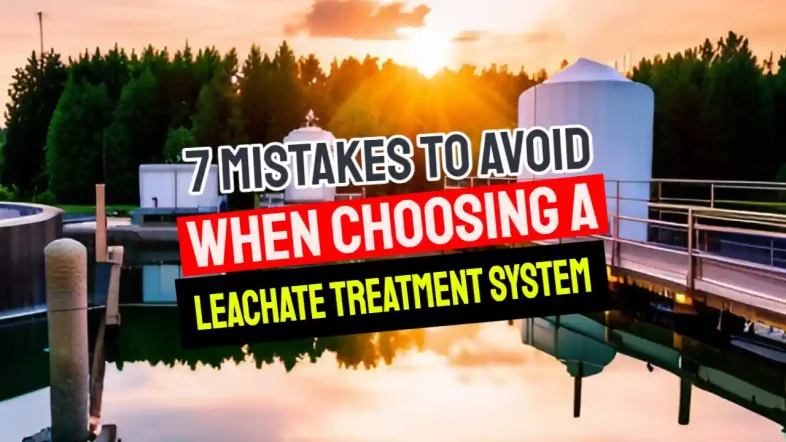When choosing a leachate treatment system it is important to get it right! The following article explains the big 7 mistakes to avoid when choosing a leachate treatment system. It always surprises me how many clients make at least one of these mistakes.
Landfills are a necessary evil in our modern society. But what happens to all the liquid waste that decomposing garbage produces? That's where leachate comes in. Landfill leachate is a highly contaminated liquid that can seep into the surrounding soil and groundwater, posing a significant threat to the environment. Thankfully, leachate treatment systems exist to break down these pollutants before they can cause harm.
However, choosing the right leachate treatment system, along with a competent design and construction contractor, is crucial for effective and long-term environmental protection. Here are 7 critical mistakes to avoid when selecting a system for your landfill:
Mistake #1: Focusing Solely on Upfront Cost

While cost is undoubtedly a major consideration, the cheapest option might not be the most economical in the long run. Here's why:
- Maintenance Costs: Simpler systems might require less initial investment, but complex leachate might necessitate frequent maintenance and replacement parts, driving up long-term costs.
- Operational Costs: Energy consumption can vary significantly between treatment methods. Evaluate the ongoing operational costs of different systems to get a complete picture.
- Disposal Costs: Treatment processes can generate residuals that require proper disposal. Factor in the cost of managing these residuals when comparing options.
Solution: Consider life-cycle costing, a method that evaluates the total cost of ownership over the expected lifespan of the system. This includes initial investment, maintenance, operation, and disposal costs.
Mistake #2: Not Considering the Characteristics of Your Leachate
Landfill leachate is a complex mixture with varying levels of contaminants depending on factors like:
- Landfill Age: Younger landfills tend to produce leachate with higher organic content, while older landfills have more inorganic contaminants.
- Waste Types: Landfills accepting hazardous waste will have leachate with different characteristics compared to those receiving solely municipal solid waste.
Solution: Conduct a thorough analysis of your leachate's specific characteristics, including parameters like BOD (Biochemical Oxygen Demand), COD (Chemical Oxygen Demand), ammonia, and heavy metals. Understanding your leachate's composition is vital for choosing a treatment system that can effectively remove the targeted contaminants.
Mistake #3: Ignoring Regulatory Compliance Requirements
Leachate treatment isn't just about environmental protection; it's also about adhering to regulations set by local and national environmental agencies. These regulations define acceptable discharge limits for various pollutants in treated leachate.
Solution: Research the specific leachate discharge regulations in your area before choosing a treatment system. Ensure the system you select can consistently meet these compliance standards.
Mistake #4: Neglecting Scalability and Future Needs

Landfills are constantly evolving. Waste acceptance rates can fluctuate, and the composition of leachate might change over time.
Solution: Choose a treatment system that can be scaled up or down to accommodate future changes in leachate volume and characteristics. Consider modular systems that allow for easy expansion or integration of additional treatment processes.
Mistake #5: Overlooking Operation and Maintenance (O&M) Requirements
The complexity of operating and maintaining a leachate treatment system can significantly impact its effectiveness and overall cost.
Solution: Evaluate the O&M requirements of different treatment systems. Consider factors like:
- Staffing Needs: Does the system require specialized personnel to operate?
- Spare Parts Availability: How readily available are replacement parts for the system's components?
- Downtime Potential: How susceptible is the system to breakdowns and how long does it take to get it back online?
Choose a system that aligns with your available resources and expertise for efficient operation and minimal downtime.
Mistake #6: Selecting a System Without Reliable Vendor Support
A reputable vendor, usually a design-and-build turnkey contractor with a proven track record and excellent customer support, is crucial for the long-term success of your leachate treatment system.
- Experience: Does the vendor have a proven history of successful leachate treatment system installations?
- Training: Does the vendor offer training programs for your staff on operating and maintaining the system?
- After-Sales Service: Does the vendor provide prompt and reliable after-sales service and technical support?
- Spare Parts Availability: Does the vendor guarantee easy access to spare parts for the chosen system?
Partnering with a reliable vendor ensures you have the necessary support to keep your leachate treatment system functioning optimally.
Mistake #7: Not Getting Expert Advice
Choosing the right leachate treatment system can be a complex task. Don't hesitate to seek professional guidance.
Solution: Consult with environmental engineers or landfill management specialists who can assess your specific needs and recommend the most suitable treatment technology. Their expertise can help navigate technical complexities and ensure you make an informed decision.
Conclusion
Selecting the right leachate treatment system is an investment in environmental protection and long-term cost-effectiveness for your landfill operation. Avoiding these 7 mistakes will ensure you choose a system that effectively treats your leachate, complies with regulations, and adapts to your evolving needs.
For a successful leachate treatment solution, conduct thorough research, consider life-cycle costs, and don't hesitate to seek professional advice. Remember, a well-chosen system safeguards the environment and ensures the sustainable operation of your landfill.
CLICK! To talk to a reputable UK contractor now!Leachate Treatment Technologies Compared
Here's a brief comparison table summarizing some common leachate treatment technologies:
| Technology | Advantages | Limitations |
|---|---|---|
| Physical-Chemical Treatment (e.g., coagulation, flocculation) | Effective for removing a wide range of contaminants, modular and scalable | High operational costs, can generate residuals requiring disposal |
| Biological Treatment (e.g., activated sludge) | Cost-effective for treating organic matter, reduces sludge volume | Sensitive to influent variations, requires skilled operation |
| Membrane Technologies (e.g., reverse osmosis) | Produces high-quality effluent, modular and scalable | High initial investment, high energy consumption. Beware: This technology may appear on paper to provide full treatment but the reality when installed may show this not to be correct |
Note: This table provides a general overview. The suitability of each technology depends on specific leachate characteristics and treatment goals.
By following these guidelines and conducting in-depth research, you can choose a leachate treatment system that meets your specific needs and protects the environment for generations to come.






